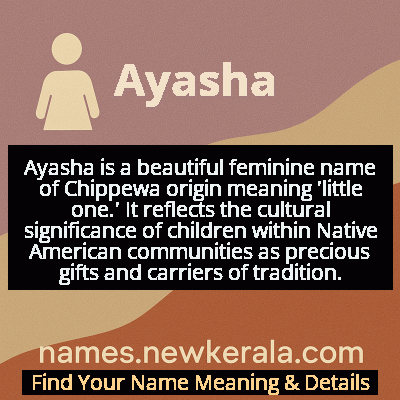Ayasha Name Meaning & Details
Origin, Popularity, Numerology Analysis & Name Meaning of Ayasha
Discover the origin, meaning, and cultural significance of the name AYASHA. Delve into its historical roots and explore the lasting impact it has had on communities and traditions.
Name
Ayasha
Gender
Female
Origin
American
Lucky Number
1
Meaning of the Name - Ayasha
Ayasha is a beautiful feminine name of Chippewa origin meaning 'little one.' It reflects the cultural significance of children within Native American communities as precious gifts and carriers of tradition.
Ayasha - Complete Numerology Analysis
Your Numerology Number
Based on Pythagorean Numerology System
Ruling Planet
Sun
Positive Nature
Leaders, ambitious, highly driven, self-reliant, innovative.
Negative Traits
Overly aggressive, domineering, impatient, selfish.
Lucky Colours
Red, orange, gold.
Lucky Days
Sunday.
Lucky Stones
Ruby, garnet.
Harmony Numbers
2, 3, 9.
Best Suited Professions
Entrepreneurs, managers, engineers.
What People Like About You
Courage, determination, leadership.
Famous People Named Ayasha
Ayasha L. Rising
Indigenous Rights Activist
Prominent advocate for Native American cultural preservation and education
Ayasha M. Cloud
Environmental Scientist
Leading researcher in sustainable land management practices with tribal communities
Ayasha K. Littlebear
Educator and Author
Developed culturally-responsive curriculum for Indigenous youth education programs
Name Variations & International Equivalents
Click on blue names to explore their detailed meanings. Gray names with will be available soon.
Cultural & Historical Significance
Historically, names like Ayasha were carefully chosen by elders and often reflected observations of the child's nature or family aspirations. The name's enduring use demonstrates the resilience of Indigenous naming practices despite centuries of cultural suppression. Today, it serves as a bridge between traditional ways and contemporary Indigenous identity, representing both cultural pride and the ongoing revitalization of Native languages and customs.
Extended Personality Analysis
Individuals named Ayasha are often perceived as nurturing, gentle, and deeply connected to their roots. They typically exhibit a quiet strength and resilience that belies their gentle exterior, showing remarkable perseverance in the face of challenges. Their 'little one' meaning often manifests as a youthful spirit maintained throughout life, bringing freshness and optimism to their endeavors.
Ayashas tend to be highly intuitive and emotionally intelligent, with strong family values and community orientation. They often serve as peacemakers in conflicts and demonstrate exceptional empathy toward others. While they may appear reserved initially, they form deep, lasting relationships and are fiercely protective of loved ones. Their combination of traditional wisdom and modern adaptability makes them effective bridges between different generations and cultural perspectives.
Modern Usage & Popularity
In contemporary times, Ayasha maintains its cultural authenticity while gaining broader recognition. The name sees steady usage within Native American communities as part of cultural revitalization efforts, particularly among families seeking to honor their heritage. Outside Indigenous communities, it's occasionally chosen by parents attracted to its melodic sound and meaningful origins. While not appearing on mainstream popularity charts, it represents a growing trend toward culturally significant names with deep roots. The name's usage reflects increasing appreciation for Indigenous languages and the movement toward decolonizing naming practices.
Symbolic & Spiritual Meanings
Symbolically, Ayasha represents new beginnings, innocence, and the preciousness of life. The 'little one' meaning extends metaphorically to represent potential, growth, and the seed from which great things develop. It symbolizes the connection between generations and the continuation of cultural traditions. The name carries connotations of protection, nurturing, and the sacred responsibility of caring for the young and vulnerable. It also represents cultural resilience—the idea that even the smallest and most vulnerable can carry forward the strength and wisdom of their ancestors.

